Go beyond the scoreboard
Get the latest on L.A.'s teams in the daily Sports Report newsletter.
You may occasionally receive promotional content from the Los Angeles Times.
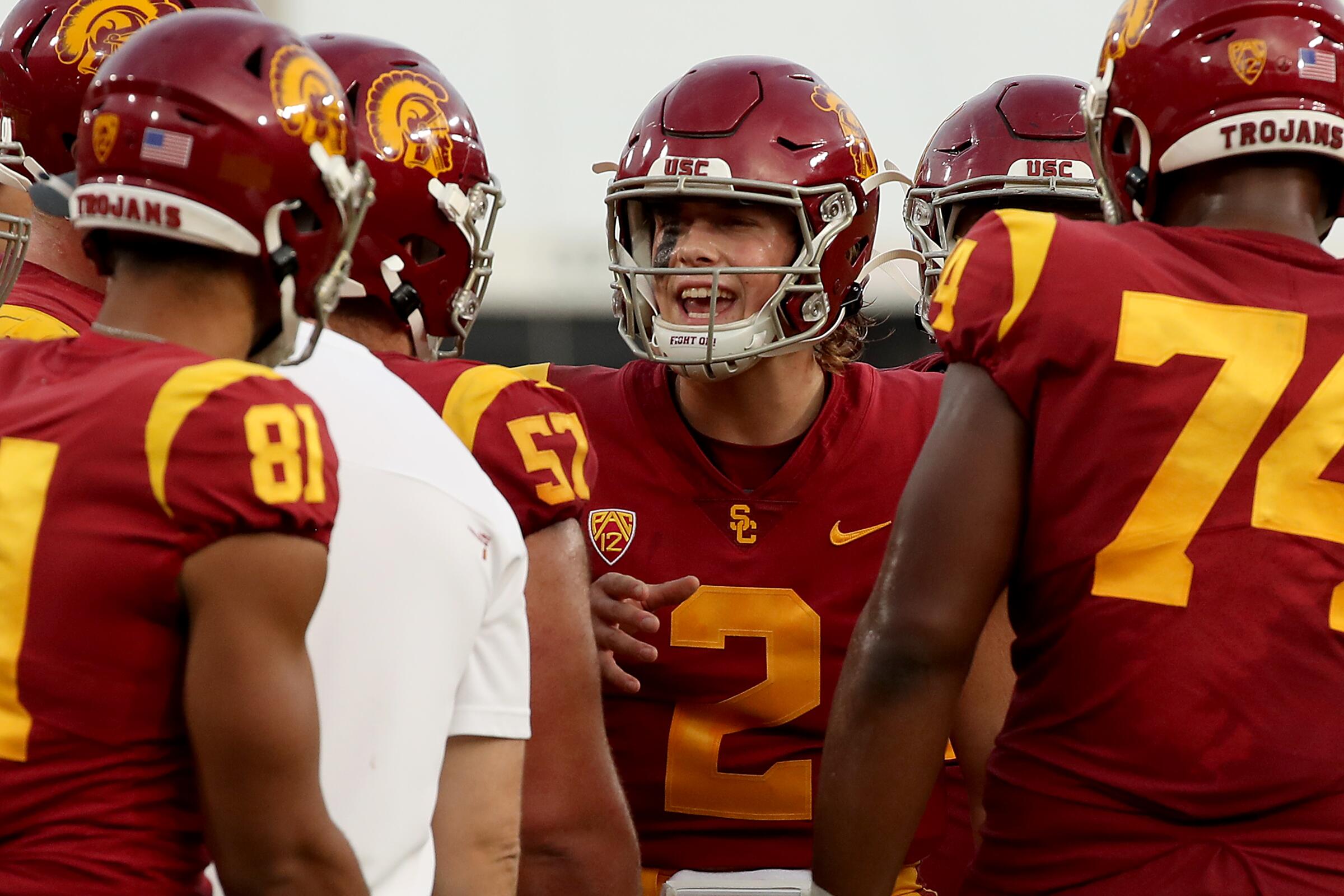
The final month of USC’s season was supposed to be its most difficult stretch, a gauntlet that included two tough road trips, a crosstown showdown with UCLA and an out-of-conference finale against already bowl-eligible Brigham Young.
The rest of the schedule turned out to be quite a slog, too, and as the Trojans enter the final month in much worse shape than they expected, their final four games have taken on a new significance. USC must win at least two of those four to avoid missing out on the bowl season for the second time in four years.
That uphill climb begins Saturday at 7:30 p.m. PDT in Tempe, Ariz., when USC meets an Arizona State team in the midst of a serious slide. The Sun Devils have played the entire season under the dark cloud of scandal, but the cracks have only started to show over the last two weeks, as they lost to Washington State and Utah by two touchdowns.
The initial college football rankings are sure to upset a lot of teams, most notably Luke Fickell’s Bearcats at Cincinnati. But that could benefit the Trojans.
Bolstered by a rushing attack that ranks among the Pac-12’s best, Arizona State will aim to run it early and often. The same strategy could be in play for USC, which comes to town as an eight-point underdog, setting up for a physical matchup in the trenches.
Here’s what to expect out of Saturday’s meeting of two Pac-12 South teams that expected to be contenders:
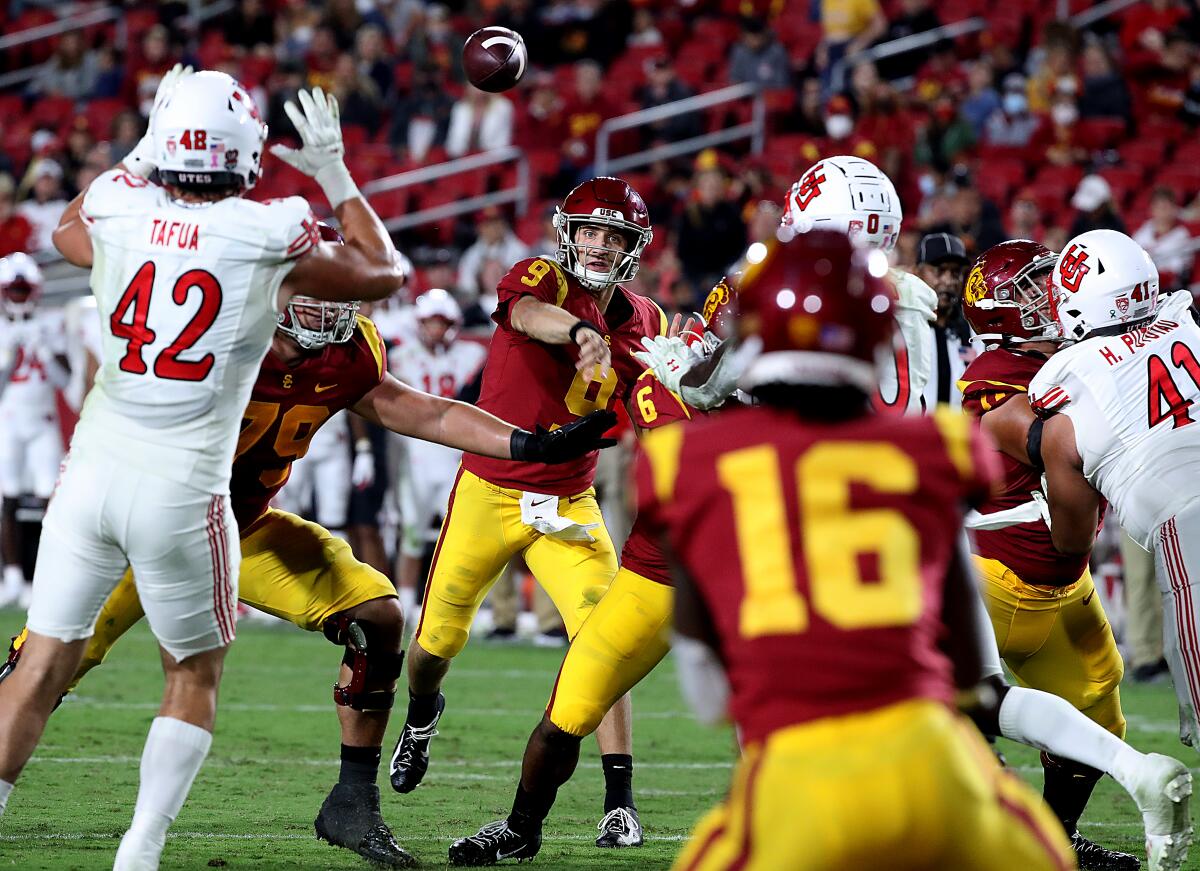
Ahead of what might be his final trip home to Arizona as a college quarterback, it’s unclear how much Kedon Slovis will play in front of friends and family.
After USC’s quarterback rotation prompted more questions than answers last week, interim coach Donte Williams opted not to elaborate on his plans for Arizona State. On Thursday, Williams suggested that he expects both Slovis and freshman Jaxson Dart to play in some capacity.
What that means for the trajectory of either quarterback remains to be seen. Slovis admitted this week that the rotation was something he’s still getting used to.
“You really have to just try to see the play and go through in your own head what you would do,” Slovis said. “The biggest thing, too, is talking to each other in between series. [That] would be big. … It’s not easy, but if we have those conversations, too, they’ll help both of us out.”
Williams did offer one answer this week about Dart, as it pertains to his eligibility. Dart could play two more games this season and still retain his status as a freshman. It doesn’t appear USC has any concerns about redshirting its freshman quarterback.
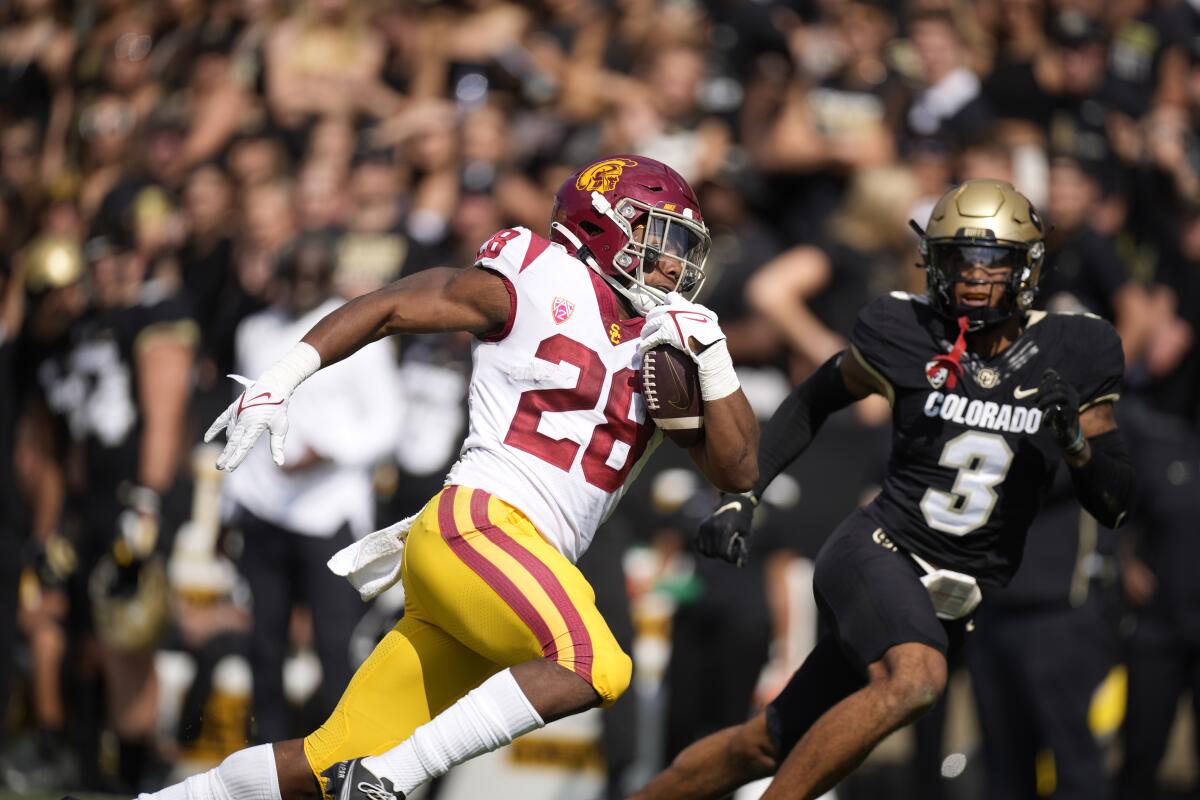
Only twice in Graham Harrell’s tenure as USC’s offensive coordinator have the Trojans exceeded 40 carries in a game. Once, in Slovis’ first road start in 2019, when BYU dropped eight defensive backs into coverage. And again last week in their win over Arizona.
The last two weeks, Keaontay Ingram has turned that added emphasis into an NFL audition. The Trojans workhorse has carried the ball 51 times over the last two weeks, more than he had over the season’s entire first month.
Ingram said the opportunity has given him the chance to prove what he’s wanted to prove since he signed with Texas in 2017. “That I could be a No. 1 back,” Ingram said, “that’s all I wanted.”
That’s no secret to Arizona State, which will assuredly stack the box to counteract USC’s reliance on Ingram. The Sun Devils have limited opposing backs to 3.7 yards per carry this season, second fewest in the Pac-12. Ingram has averaged 6.7 over his last two standout performances.
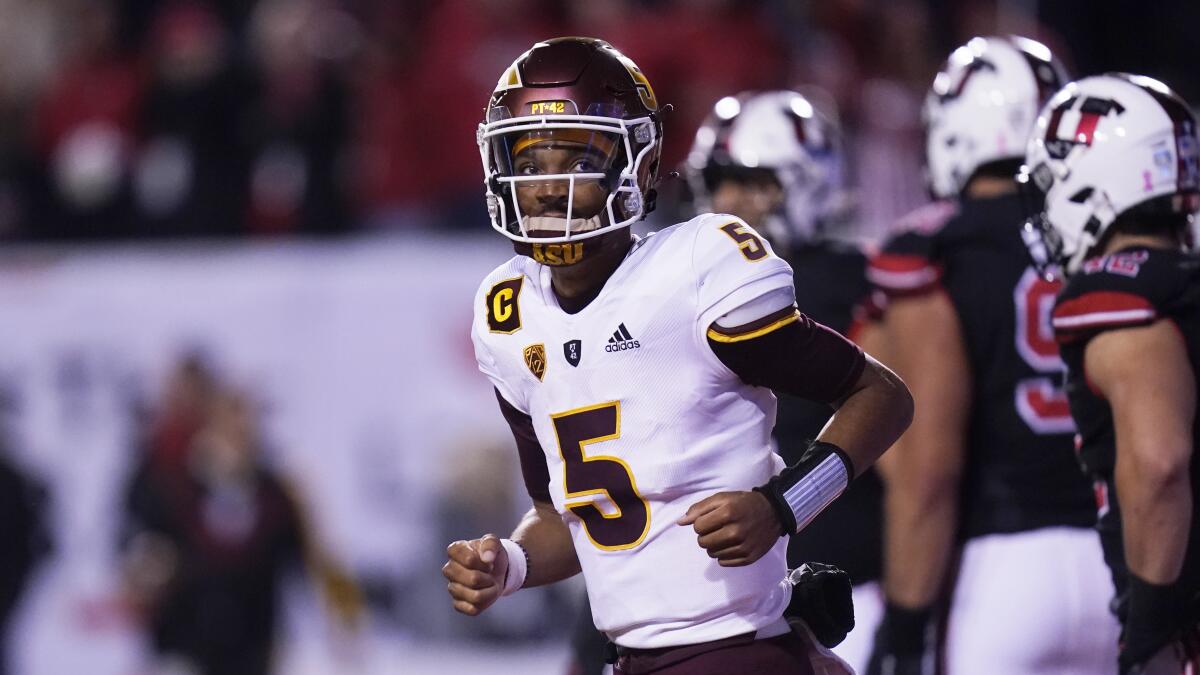
It was hard to imagine a worse start coming off a bye week. As Arizona State tried to get started on the right foot last Saturday, it opened its eventual loss to Washington State in the exact opposite fashion, turning the ball over on its first three possessions.
The Sun Devils had two more turnovers, with dual-threat quarterback Jayden Daniels accounting for all five. Washington State took full advantage, scoring 24 points off those five ill-fated drives.
USC could surely use a similar break Saturday. Its defense has given up at least 383 yards in four of its last five games.
Despite the atrocious effort from Arizona State last week, the Trojans actually have a worse turnover margin than their opponent. They’re hoping to change that this week.
“It’s about being extremely smart,” Williams said. “Coach [Todd] Orlando, I’m pretty sure he’s going to dial up some pressures there and certain things to help dial up some chaos.”
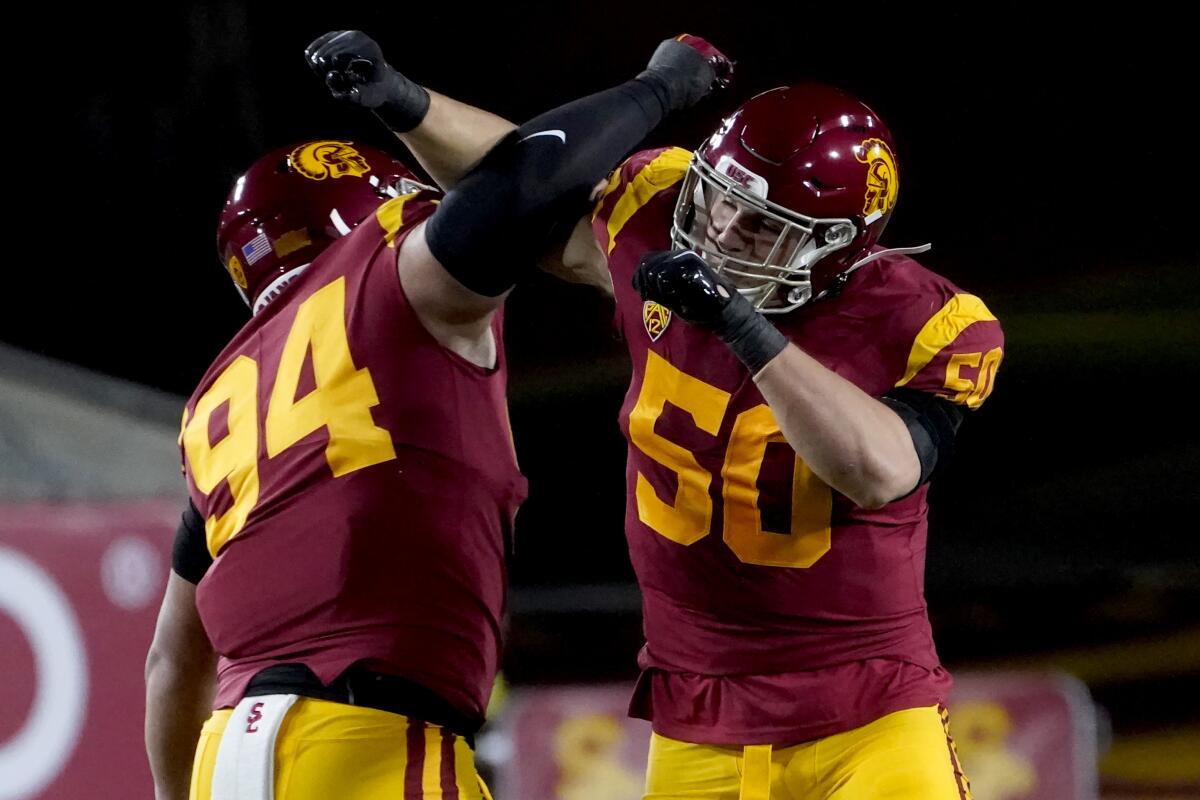
Blitzes will likely be a prominent part of USC’s defensive strategy, considering it could again be without most of its depth on the interior.
Defensive end Nick Figueroa, who had been dealing with a shoulder injury, is a game-time decision with a “lower leg” injury, Williams said. Defensive tackle Jamar Sekona is also day to day because of an arm injury.
Defensive tackle Max Gibbs has filled the void in the middle, but with four games under his belt, Williams said the staff was considering whether or not to redshirt him. It may not have a choice but to play him, given the lack of depth on the interior.
Go beyond the scoreboard
Get the latest on L.A.'s teams in the daily Sports Report newsletter.
You may occasionally receive promotional content from the Los Angeles Times.